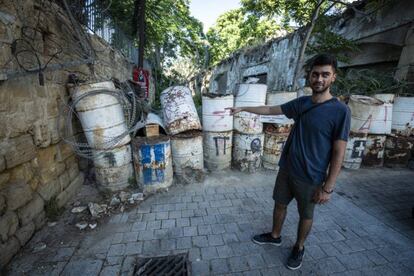Why master’s degree graduates are signing up to be EU volunteers
With youth unemployment rates through the roof, particularly in the south, many educated young people are choosing unpaid work over a salaried position in a job they don’t like


It all started three years ago in Gandia, a Spanish city in the eastern Valencia region. Cypriot Alexandros Ioannou Peletie was then 26 years old. He had studied business, finishing his studies in Scotland. There was not a lot of work around so he decided to work as a volunteer in the Spanish Mediterranean with a placement from the European Voluntary Service (EVS).
The accommodation, trip and bills would be paid for him for a year. He was given an additional stipend of just over €200 a month to live on. His task was to travel to the towns in the area promoting EVS and the popular Erasmus student exchange program, both of which have the official EU stamp. “That was the idea,” he explains. “But people weren’t interested, the communication wasn’t great and I didn’t speak Spanish.”
Alexandros then resorted to Plan B, which was recycling the trash he picked up. In other words, he became involved in the circular economy, something he had hardly even heard of when he began. Three years on, and Alexandros is living from teaching others about it and recycling in a workshop located in an old market-turned-social center in Nicosia, the capital of Cyprus. It has been a personal journey that would not have been possible without the volunteering adventure in Gandia.
There is no better form of payment than seeing change because of your actions
Volunteer Andreas Charalambous
In order to volunteer with the EVS – now rebranded the European Solidarity Corps, with a budget of €375 million for 2018-2020 – applicants must be between 18 and 30, be residents of the EU or a neighboring country such as Iceland, Morocco, Liechtenstein or Russia, have no plans for 12 months maximum, choose a project in the field of culture, the environment, health or immigration, and wait for the call. Think of it as an Erasmus for working, not studying. It has become an attractive option for thousands of young Europeans who have suffered the brunt of the crisis and a soaring unemployment rate, particularly in the south, where youth unemployment is well over 20%.
But what did Alexandros’ EVS experience have to do with collecting trash? “Being a volunteer was like, wow [he shoots his arm behind his back]; I took a step back, it was a step out of my comfort zone in a new country with a new language… And that reactivates your brain. Big things become clearer,” he explains.
Alexandros was struck by the amount of recyclable material that ends up in the trash or in places it shouldn’t be. “I found it devastating,” he said. He convinced an organization to give him a space where he could store some of the debris and put it to a different use. He continued going from town to town, telling the youngsters in each about Erasmus and EVS but now he was also explaining his new project to them. He called it Tesura, a hybrid of the Spanish word for treasure – tesoro – and the word for trash – basura. It worked, and he took the initiative back home.
A 29-year-old Italian named Federico Ribechi works at a center of Caritas, the Catholic humanitarian organization, just five minutes from the old market in Nicosia. It is close to one of the most striking border crossings in the heart of the capital, which was split in two along with the rest of the country during the 1974 Turkish invasion.

Federico looks rattled and huffs. The situation is somewhat confusing: on the one hand, he has to find out why a Russian woman who is apparently a tourist has turned up at the center wanting to apply for asylum. On the other hand, he has to help an Arabic family with a demanding child find out about their papers. He is stressed – but in a good way.
“When I got to Caritas, I thought I was just a European guy who helped refugees from Africa and the Middle East,” he says. “But then I realized that I had a certain knack for dealing with people in terrible situations; people who were coming from war, who had been trafficked, or who had been the victims of sexual violence, the worst kind of situations.” He found that being entertaining, open, knowing how to lend a hand and make jokes could be a useful skill.
Federico arrived in Nicosia to do a European volunteering job. His resume says he has a bachelor’s degree in political science, a master’s degree in international relations and experience working in bars and restaurants in his hometown of Rome.
In 2013, youth unemployment rose to 40% in Cyprus
“I never felt satisfied at work,” he says. “My studies were fine but I wanted to feel satisfied.” That need pushed him to sign up as a volunteer with Youth for Exchange and Understanding Cyprus (YEU). Everything went well, and then it went even better when he started working with Caritas. The feeling was mutual and the NGO ended up giving him a contract.
Alexandros, Federico… there are others too who have ended up in Cyprus. All with higher education behind them; many signed up by YEU: Óscar Fernández, a 25-year-old Spaniard (history); Miranda Zavrou, a 28-year-old Cypriot (accounting); Adina Nutu, a 29-year-old Romanian (history), Chloe Burlit, a 26-year-old from Martinique (marketing); Gabriele Occhiodoro, a 30-year-old Italian (theater).
Asked if there were any drawbacks to doing volunteer work over the age of 25, they all agreed that it was better to be a volunteer in something you enjoyed than get paid in something you didn’t; better to continue to grow personally on a minimal income that take any old job.
Twenty-eight-year-old Andreas Charalambous, a Cypriot, sits in a café close to the security checkpoint that leads into the north of the island. He is a journalist and a volunteer. “People see it as working for someone who doesn’t pay you,” he says. “And if you asked me, I also wouldn’t volunteer for someone who was getting rich at my expense.”
Andreas was an EVS volunteer in Italy in 2017. His volunteer experience was shorter than most. He spent three months on the audiovisual production of a touring music festival. They told him he might be sleeping on the floor for 15 days but the rest of the time he would have a bed. “It was a bit frustrating because it was exactly the opposite,” he says.
Now, looking back, he laughs. It helped him become more adaptable, to be better organized and to work in a team. It was a world filled with creativity, but also with short deadlines in which he worked side by side with people from Taiwan, Uruguay, Italy and Russia.
He still does a bit of volunteering now but in other things. “The experience of contributing to society is one of the best feelings I’ve had,” he says. “You could say I’m addicted to it. There is no better form of payment than seeing change because of your actions.”
It’s a way of life that he combines with paid work. He recently opened an arcade bar and has put himself forward as a candidate for the Nicosia municipal elections that will take place in 2021.
A generation struggling with unemployment
Cyprus, Italy, Spain, Greece, France and Portugal were and still are the countries worst hit by the financial crisis, which had particularly damaging repercussions for young people. The figures for youth unemployment climbed rapidly above two digits. Spaniards were badly hit and continue to suffer the consequences, with unemployment rates above 30%. That puts Spain just slightly behind the Italians and the Greeks, but it was Cyprus that broke the record in 2013 with 40% of young people out of work. This figure has since dropped to just below 20%.
Menelaos Menelaou, the director of the Youth Council of Cyprus, says that “the biggest problem for young people is the lack of goals. They don’t know what to expect or what to do. It is very hard for them to plan their future, or start a family. They don’t have a social income and that could generate a social problem in the long term.”
Of course, in Cyprus, like in the other southern countries, the social fabric and above all the family, are there to soften the blows.
English version by Heather Galloway.